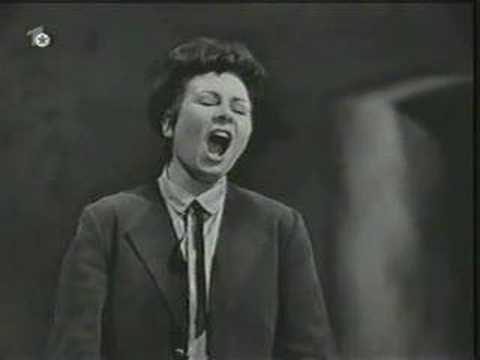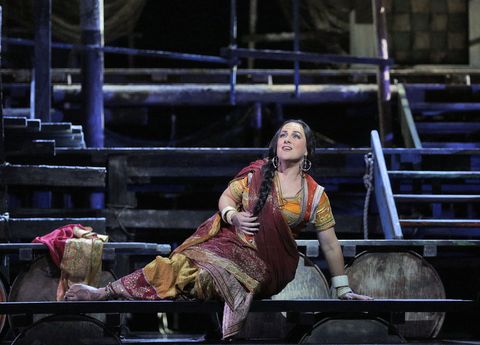|
SATURDEE OPRY LINKS 65:
Heroes and Heroines
 
Christa Ludwig as Leonora in "Fidelio"
Diana Damrau as Leila in "Pearl Fishers"
Saturdee Opry Links Overture!
"Oberon," by Von Weber
https://www.youtube.com/watch?v=ar56QA_4Pts
1.
Being the most beautiful woman in the world can be a real burden. Especially
when goddesses go around, promising you to some exceptionally handsome shepherd
as a prize in a contest, without stopping to think that you are already married
to Ménélas, the King of Sparta. There really isn’t much the beautiful Helen can
do, when fate, Venus and the augur Calchas conspire to send her husband off to
Crete, and then send her this ‘dream’ of the handsome shepherd, who is actually
Prince Paris of Troy in disguise. . .Got it? The preceding summary (shamelessly
stolen from some website or other) is the gist of what is being sung in "Au Mont
Ida," the sprightly aria from Offenbach's comic opera, "La Belle Helene." But
it's just as well to forget what the aria is about and enjoy the heroic melody,
which will never be more heroically sung than it was by Jussi Bjorling. (No
translation available, anyhow!) Good morning. Saturdee Opry Links hath arrived.
https://www.youtube.com/watch?v=cAWONdKf92o
2.
Speaking of heroic arias, and speaking of Jussi Bjorling. . .Here is a live
recording from 1941. Because it's live, that last big note (or two) is somewhat
obscured by the orchestra, but rest assured that, in person, it soared over
everything. "Di Quella Pira," from Verdi's "Il Trovatore" ("The Troubador.")
Voice Part: tenor Fach: spinto tenor
Setting: A room adjoining the chapel at Castellor, 1409.
Synopsis: Manrico, an officer in Prince Urgel's army and the supposed son of the
gypsy woman Azucena, has discovered that his mother has been captured by the
Count of Luna and is about to be burned at the stake. Furious, Manrico calls
together his soldiers and sings valiantly of how they will save Azucena from
death.
https://www.youtube.com/watch?v=tlZYwPWMkhA
Translation:
http://www.aria-database.com/search.php?individualAria=514
SPOTLIGHT:
Bjorling: He Sang With A Tear in His Voice
https://www.operanews.com/Opera_News_Magazine/2014/2/Recordings/Jussi_Bj%C3%B6rling__He_Sang_With_a_Tear_in_His_Voice.html
3.
"Vissi d'arte" from Puccini's "Tosca" is not, of course, thought of as a heroic
aria, but there is deep heroism in the character when this is sung. The aria is
also, sad to say, very topical right now. Beautiful Floria Tosca, a celebrated
singer, has just been a victim of sexual extortion by the chief of police,
Scarpia. Scarpia has arrested Tosca's beloved, the painter Mario Cavaradossi,
threatening to execute him unless Tosca has sex with him. She agrees, and is
left alone to contemplate her fate. "I lived for art, I lived for love / I have
never harmed a living soul / Why, o Lord, do you reward me this way?" (Not to
worry. Tosca soon stabs Scarpia to death rather than submit.) Maria Callas, live
on stage, 1958.
https://www.youtube.com/watch?v=pAqZ6TgW8AA
Translation:
http://www.aria-database.com/search.php?individualAria=302
4.
"Micaela's Aria" from Bizet's "Carmen" really has much in common with Puccini's
"Visi d'arte," doesn't it? Both are sung in moments of fear, despair,
desperation. Both are laments over the dangers the characters are enduring.
Tosca decries God's abandoning her, while Micaela prays for strength. Here is a
beautiful clip of young Mirella Freni singing "Je dis que rien ne m'épouvante"
from "Carmen." "I say that nothing can frighten me. . ."
https://www.youtube.com/watch?v=zJO5MyNfEOU
Synopsis:
Carmen and José enter with the smugglers and their booty ("Écoute, écoute,
compagnons"); Carmen has now become bored with José and tells him scornfully
that he should go back to his mother. Frasquita and Mercédès amuse themselves by
reading their fortunes from the cards; Carmen joins them and finds that the
cards are foretelling her death, and José's. The women depart to the customs
officers who are watching the locality. José is placed on guard duty. Micaëla
enters with a guide, seeking José and determined to rescue him from Carmen ("Je
dis que rien ne m'épouvante"). On hearing a gunshot she hides, alone, in fear.
Translation:
http://www.aria-database.com/search.php?individualAria=41
5.
The current cliche, "speaking truth to power" would apply here. The poet, Andrea
Chenier, is invited to a wing-ding thrown by the rich and powerful. The Countess
hosting the affair asks the quaint, colorful poet to recite, effectively turning
him into a performing monkey. Chenier recites, all right, a poem that contrasts
the beauty of nature with the fiendishness, excess, and misery indulged by
humankind. He heroically sings of the injustices suffered by the working people,
and condemns authority for simply perpetuating itself, and its wealth. My kind
of poet. Placido Domingo sings the hell out of "Un di all'azzuro spazio guardai
profondo" ("One day to the blue skies I looked profoundly. . .") from "Andrea
Chenier," by Umberto Giordano. With English subtitles.
https://www.youtube.com/watch?v=_L_rvQh0EJ0
Translation:
http://www.aria-database.com/search.php?sid=2f394a2b229b43913ade319e2f110446&X=1&individualAria=49
6.
Standing for peace is always heroic, is it not? Perhaps there is no more elegant
a plea for peace in opera than in Bellini's "Norma." The aria, "Casta Diva" also
represents one of the breakthrough innovations of Bellini, that of the long,
flowing melodic line. Here is the great Sumi Jo, in a concert performance.
Everybody's talkin' 'bout bagism, dragism. . .oh, wait, that's a different peace
song.
https://www.youtube.com/watch?v=kG4L0wHDMp8
Summary:
Synopsis: The Druids have come to meet with Norma, their high priestess. They
want to revolt against their Roman oppressors but Norma convinces them that
their time to rise up has not come yet. The Romans will be defeated by their own
failings. Norma then invokes the moon and prays for peace. While the chorus of
Druids sings their derison for the Romans, Norma sings her cabaletta, privately
worrying that that the hatred for the Romans must also translate to hatred for
Pollione, her secret Roman lover.
Translation:
http://www.aria-database.com/search.php?individualAria=356
7.
From Druids to Brahmans. Another time, another priestess. Leila stands on a wild
and rocky shore on the coast of Ceylon and calls for Brahma to ward off evil
spirits. Good idea! A song for our time. From Bizet's "Pearl Fishers" (currently
at LA Opera), this is "O Dieu Brahma." The soprano is Diana Damrau.
https://www.youtube.com/watch?v=xQQ3uEeMEFI
Translation:
http://www.opera-arias.com/bizet/les-p%C3%AAcheurs-de-perles/o-dieu-brahma/
8.
Another great hero of the people! Cola Rienzi, Roman tribune, brother of Irene,
has been excommunicated for leading a force of Roman citizens against the
treacherous Roman nobles, prompting everyone to abandon their support of him. On
the brink of disaster, Rienzi prays to God that he might be given strength to
weather the crisis. He feels that he is doing God's work by empowering the
common citizen. Here is that moving, noble prayer, "Allmächt'ger Vater, Blick
Herab" ("Almighty father, look down. . .") from "Rienzi," by Wagner. The tenor
is the great, whether you like his baritenor or not, Jonas Kaufmann.
https://www.youtube.com/watch?v=Stu4kFCvwfw
Translation:
http://www.aria-database.com/search.php?individualAria=1269
9.
There is perhaps no greater heroine in opera than Leonora from Beethoven's
"Fidelio." After all, she disguises herself as a man in order to enter the
prison where her beloved Florestan is being held, and springs him. Here is a
wonderful clip of Christa Ludwig with "Komm Hoffnung," or "Come Hope."
https://www.youtube.com/watch?v=CEdHa4AemLI
Translation:
https://www.opera-arias.com/beethoven/fidelio/komm-hoffnung/
10.
Today's Saturdee Opry Links Heroes and Heroines edition concludes with the
pledge two men make to remain friends, despite their love for the same woman.
(Now that's heroic, folks.)
Yes, it's "Au Fond du Temple Saint," from Bizet's "Pearl Fishers" (now playing
at L.A. Opera---no, I'm not paid to say so, though I should be.) We go way back
to 1906 for this one. Here are baritone Mario Ancona and. . .Enrico Caruso.
https://www.youtube.com/watch?v=rVoAFqrk2_4
Translation (scroll down), other goodies:
http://medicine-opera.com/2012/03/the-pearl-fishers-duet/
Saturdee Opry Links Encore!
Hark, how the sailor's cry joyously echoes nigh:
Santa Lucia, Santa Lucia!
https://www.youtube.com/watch?v=1ebrnxY0Fuw
Translation, about:
https://en.wikipedia.org/wiki/Santa_Lucia
Back to Opera Links
Back to Home Page
|



